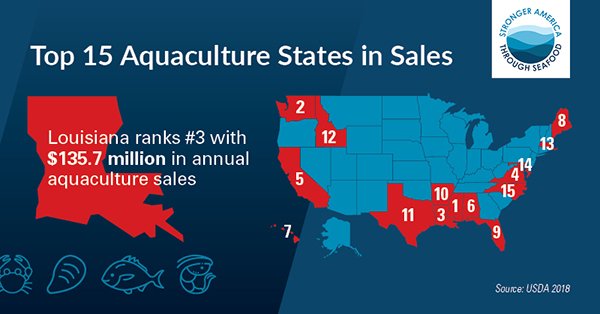Louisiana’s Thriving Aquaculture Industry Supports U.S. Economy
Louisiana is one of the many U.S. states benefiting from aquaculture's opportunities – from creating new jobs and generating more revenue to supplying communities with local and sustainable seafood.
Ranked third in the U.S. for farmed fish sales, Louisiana has one of the most diverse aquaculture industries in the country, producing crawfish, catfish, alligators, oysters, tilapia, baitfish, crabs and more. Farm-raised crawfish, catfish, and oysters were the three largest segments in the state’s industry, contributing to an economic impact in Louisiana of nearly $619 million in 2019.
Louisiana and its neighboring states in the South comprise the top U.S. region for farmed fish production. See below if your state ranks on the Top 15 States in Aquaculture Sales list.
Success in the states demonstrates a clear case for expanded offshore aquaculture in the U.S. and a need for immediate federal legislation to tap into aquaculture’s economic opportunities. While half of the world’s seafood is farm-raised, the U.S. ranks just 16th in aquaculture production with an annual output valued at $1.5 billion, only 0.6% of the total $263 billion global aquaculture market.
Stronger America Through Seafood (SATS) interviewed three local experts to learn more about aquaculture’s potential for Louisiana with clear and consistent regulations on the federal level.
C. Greg Lutz, Professor and Aquaculture Extension Specialist, Louisiana State University Agricultural Center
“The regulatory and policy-making environment in Louisiana is supportive of aquaculture because of a track record of significant economic benefits to various parts of the state… An offshore aquaculture industry, when fully developed, could generate many millions more in economic activity for coastal communities because the state is uniquely positioned in terms of onshore seafood-related infrastructure, geographic location, and proximity to prime offshore sites…The most direct economic benefits would, of course, accrue to the coastal communities near offshore opportunity areas. Docks, machine shops, processors, cold storage facilities, transport businesses, and all the regional service industries and interrelated businesses would be positively impacted. Tax revenues generated through aquaculture-related commerce would support local schools, infrastructure, and other public services.”
Sam Carroll, Director, The Seafood Promotion and Marketing Board, established by the State of Louisiana
“The crawfish aquaculture research facility in Louisiana is one of the biggest assets we have. They boast 24 one-acre experimental crawfish ponds and have a huge lab space dedicated to various parts of crawfish aquaculture research. This is a huge asset to our crawfish fisherman in Louisiana because they can use resources and discovery from this lab to help them at their own farms. Issues with invasive crawfish, seeding, and water quality are all researched at this facility in hopes to provide the rest of our state’s fisherman with answers for their own farms… The potential job positions [of aquaculture expansion] surpass beyond just the farming of the seafood itself. It also opens more study opportunities with genetics, animal nutrition, performance improvement, fish reproduction, and immune function. It is fascinating that we can grow and harvest seafood from a somewhat controlled environment. The studies to further our knowledge in these areas can help the trend as aquaculture continues to rise.”
Stan Harris, President & CEO, the Louisiana Restaurant Association
“[Aquaculture] could provide new opportunities for those who are seeking the ability to enter or expand their commercial fishing and harvesting business. The demand for seafood from the Gulf of Mexico continues to expand. To meet this demand, we’ll need to rely upon aquaculture to expand the hatchery and species propagation in the wild.”

